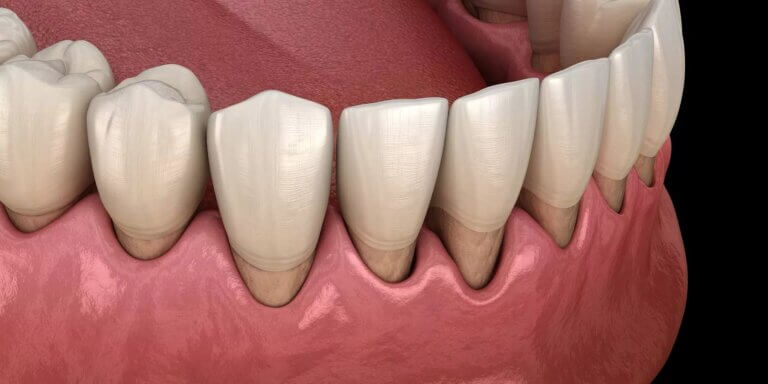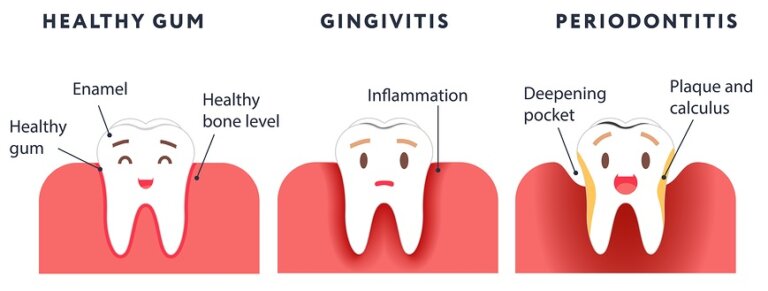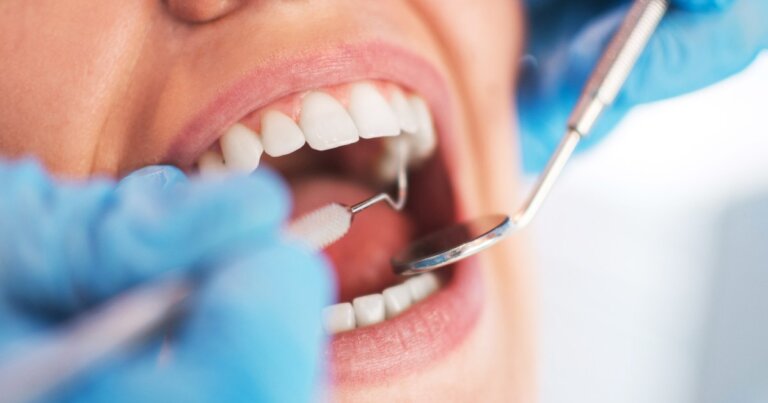Gingivitis

What Is Gingivitis?
Gingivitis is a mild but common form of gum disease characterized by inflammation, redness, and swelling in the gums. It typically occurs due to poor oral hygiene, which allows plaque—a sticky film of bacteria—to build up on the teeth. Over time, this plaque can harden into tartar, further irritating the gums.
Early Signs of Gingivitis:
- Red, swollen, or tender gums
- Bleeding gums during brushing or flossing
- Persistent bad breath
- Sensitive gums around the tooth
Although gingivitis is a reversible condition, ignoring these symptoms can lead to periodontitis—a more advanced stage of gum disease. It’s crucial to seek prompt treatment and practice good oral hygiene to stop gingivitis from advancing.
Before you contact a Toronto dentist to examine for possible Gingivitis, there are some things you should know as a patient:
- Difference Between Gingivitis And Periodontitis
- Why Do I Have Gingivitis?
- Signs And Symptoms Of Gingivitis
- Treatment Options For Gingivitis
- Managing Gingivitis Until You Can See The Dentist
- Frequently Asked Questions About Gingivitis
If you have questions about Gingivitis or other dental problems, please contact us for more information.
Difference Between Gingivitis and Periodontitis
Gum disease exists on a spectrum, ranging from gingivitis to periodontitis:
- Gingivitis: Early-stage gum disease that affects the gums without causing permanent damage to the supporting structures of the teeth. At this stage, bacteria-filled plaque irritates the gums, but the teeth remain firmly anchored in the bone.
- Periodontitis: An advanced form of gum disease where bacteria spread below the gum line, leading to bone and tissue destruction. Over time, this can cause deep pockets around the teeth, bone loss, and even tooth loss.
Since all cases of periodontitis begin with gingivitis, it’s vital to address gum inflammation early. If you experience swollen, bleeding gums or persistent bad breath, consult a dentist for an evaluation. If you have further questions about Gum Disease or gingivitis, please contact us.

Why Do I Have Gingivitis?
There are various reasons why someone might develop gingivitis, including:
- Poor Oral Hygiene: Inadequate brushing and flossing can allow plaque to build up along the gum line, eventually hardening into tartar and causing irritation.
- Hormonal Changes: Fluctuations during pregnancy, puberty, or menopause can make gums more sensitive and prone to inflammation.
- Certain Medications: Some drugs, like anti-seizure and blood pressure medications, can cause dry mouth, which increases the risk of gingivitis.
- Smoking: Smoking weakens the immune system, making it harder for the body to fight off infections like gingivitis.
- Genetics: Some people are genetically predisposed to gum disease, even with good oral hygiene habits.
Identifying the underlying cause can help in tailoring a treatment plan to manage and prevent gingivitis effectively. If you have further questions about Gingivitis, please contact us.
Signs and Symptoms of Gingivitis
f you notice any of the following symptoms, it’s important to schedule a dental appointment as soon as possible:
- Red or Swollen Gums: Healthy gums should be pink and firm. Red, puffy gums are a sign of inflammation.
- Bleeding Gums: Gums that bleed when you brush or floss are often a sign of gum disease.
- Bad Breath: Persistent bad breath, even after brushing, could be due to bacteria buildup in the gums.
- Sensitive Gums: Inflammation can make gums tender to the touch, as well as more sensitive to hot or cold foods.
Gingivitis is a treatable condition, and early intervention can prevent further damage to your teeth and gums. If you have further questions about the signs and symptoms of Gingivitis, please contact us.
Treatment Options for Gingivitis
Gingivitis is treatable and reversible with a combination of professional care and improved oral hygiene practices. Here are the main treatment approaches:
- Improved Oral Hygiene: Regular brushing and flossing can remove plaque and prevent it from hardening into tartar. Brushing with a soft-bristled toothbrush and using an antimicrobial mouthwash can also help.
- Professional Dental Cleaning: A dental cleaning, or scaling, removes plaque and tartar buildup from your teeth and gums. This can significantly reduce inflammation and allow your gums to heal.
- Lifestyle Changes: Quitting smoking, managing stress, and maintaining a healthy diet all support oral health and can help in reducing gum inflammation.
With consistent treatment, gingivitis can be reversed, restoring your gums to a healthy state. Ignoring the symptoms, however, can lead to periodontitis, resulting in more serious health issues, including tooth loss. If you have further questions about treatment options for Gingivitis, please contact us.

Managing Gingivitis Until You Can See the Dentist
If you can’t see a dentist immediately, here are a few ways to manage gingivitis symptoms at home:
- Brush and Floss Gently: Use a soft-bristled toothbrush to avoid further irritation.
- Rinse with Salt Water: Salt water can help reduce inflammation and bacteria in your mouth. Mix a teaspoon of salt in a glass of warm water, swish for 30 seconds, and spit it out.
- Use Over-the-Counter Pain Relievers: If you’re experiencing pain, you can take ibuprofen or acetaminophen as directed on the label.
- Avoid Smoking and Alcohol: These substances can irritate your gums and make symptoms worse.
- Eat a Nutrient-Dense Diet: A diet high in vitamins C and D, as well as calcium, can help strengthen your immune system and support gum health.
While these methods can alleviate symptoms, they do not replace professional dental care. Schedule a dental appointment as soon as possible to get proper treatment. If you have further questions about managing Gingivitis, please contact us.
Frequently Asked Questions About Gingivitis
- How can I prevent gingivitis?
Maintain good oral hygiene by brushing twice daily, flossing daily, and visiting your dentist regularly for check-ups and cleanings. Avoid tobacco use and manage underlying health conditions.
- Is gingivitis contagious?
While the bacteria that cause gingivitis can be transmitted through saliva, the disease itself is not directly contagious.
- Are there home remedies for gingivitis?
Improving oral hygiene is crucial. Some find rinsing with warm saltwater helpful, but it’s essential to consult a dentist for appropriate treatment.
- When should I see a dentist about gingivitis?
If you notice persistent gum bleeding, swelling, or tenderness, schedule an appointment with your dentist promptly to assess and address the issue.
Gingivitis is a preventable and treatable condition that can significantly impact your oral and overall health if left unaddressed. If you have further questions about how to prevent Gingivitis, please contact us.

